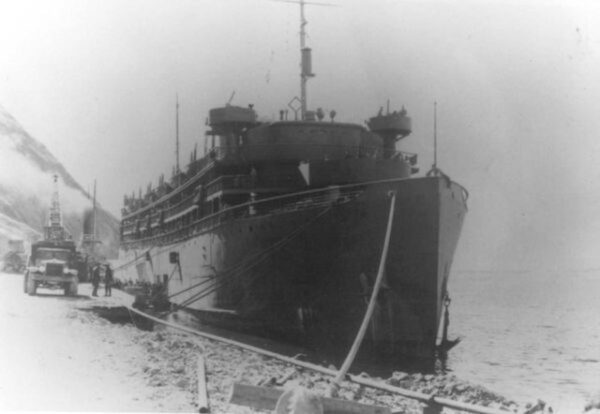
On Feb. 3, 1943, the U.S.A.T. Dorchester was torpedoed and sunk during the Battle of the Atlantic.
Four Chaplains Day commemorates the sacrifices made by four U.S. Army chaplains, who gave their lives trying to save as many lives as possible after a Nazi submarine torpedoed the U.S. Army transport Dorchester on Feb. 3, 1943, as it crossed the Atlantic Ocean.
The Four Chaplains Day Story
Prelude to the attack on the Dorchester: the Battle of the Atlantic
After the Attack on Pearl Harbor by Imperial Japan, and the United States’ subsequent declaration of war against Japan’s ally, Nazi Germany, the Battle of the Atlantic intensified greatly.
Well aware that an American presence in Europe could tip the scales against Germany, Nazi submarines ferociously targeted American transports, military and otherwise, as they attempted to ferry supplies and troops to staging grounds in the United Kingdom.
Jan. 23, 1943: The U.S.A.T. Dorchester Leaves Port for the United Kingdom
As part of the continued effort to stockpile troops and supplies, the Dorchester departed its homeport in New York on Jan. 23, 1943, with roughly 900 military and civilian passengers and crew. Initially bound for Greenland, before its ultimate destination in the United Kingdom, the Dorchester was part of a small convoy escorted by the U.S. Coast Guard.
Feb. 23, 1943: The Dorchester is torpedoed by a Nazi U-Boat
Despite warnings that a Nazi U-boat had been spotted on sonar, the Allies were ill-equipped to protect every ship sailing across the Atlantic at this point in the war. Just after midnight on Feb. 23, 1943, the Dorchester was struck off the coast of Newfoundland by a Nazi torpedo.
The Four Chaplains
Immediately after the Dorchester was struck, the ship lost power and began sinking. Army chaplains Reverend George L. Fox, Rabbi Alexander D. Goode, Father John P. Washington, and Reverend Clark V. Poling began assisting with the evacuation. Life jackets were dispersed and passengers were directed to the lifeboats.
Unfortunately, the Dorchester lacked enough life jackets for everyone on board. While passengers and crew members continued to seek refuge off the ship, all four chaplains gave up their life jackets, well aware that the frigid waters of the North Atlantic offered virtually no chance of survival.
As the ship continued to sink, survivor accounts claim the four chaplains held arms while singing hymns. None of the four survived, and the attack ultimately led to the deaths of over 700 people.
Legacy of Four Chaplains Day
On Dec. 19, 1944, Fox, Goode, Washington, and Poling were each posthumously awarded the Distinguished Service Cross and Purple Heart. Nearly two decades later, each chaplain was awarded the Four Chaplains’ Medal by Congress to be held in the same esteem as the Medal of Honor.
In 1988, Congress designated February 3 as Four Chaplains Day.
Click here to learn about more U.S. Military and Veterans events.














Any ceremonies in the district?